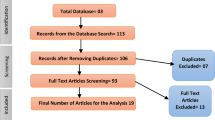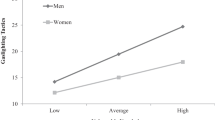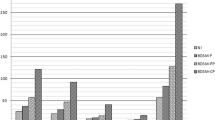Abstract
Childhood sexual abuse is common among HIV-infected persons, though few empirically supported treatments addressing sexual abuse are available for men and women with HIV/AIDS. This study reports the outcome from a randomized controlled trial of a group intervention for coping with HIV and sexual abuse. A diverse sample of 202 HIV-positive men and women who were sexually abused as children was randomly assigned to one of three conditions: a 15-session HIV and trauma coping group intervention, a 15-session support group comparison condition, or a waitlist control (later randomly assigned to an intervention condition). Traumatic stress symptoms were assessed at baseline and post-intervention, with analysis conducted for the three-condition comparison followed by analysis of the two-condition comparison between the coping and support group interventions. Participants in the coping group intervention exhibited reductions in intrusive traumatic stress symptoms compared to the waitlist condition and in avoidant traumatic stress symptoms compared to the support group condition. No differences were found between the support group intervention and waitlist conditions. Tests of clinical significance documented the meaningfulness of change in symptoms.

Similar content being viewed by others
References
Allers, C., Benjack, K., White, J., & Rousey, J. (1993). HIV vulnerability and the adult survivor of childhood sexual abuse. Child Abuse and Neglect, 17, 291–298.
Beck, A. T., & Steer, R. A. (1993). BDI: Beck depression inventory manual. New York: Psychological Corporation.
Bedimo, A., Kissinger, P., & Bessinger, R. (1997). History of sexual abuse among HIV-infected women. International Journal of STD & AIDS, 8, 332–335.
Bensley, L. S., Van Eenwyk, J., & Simmons, K. W. (2000). Self-reported childhood sexual and physical abuse and adult HIV-risk behaviors and heavy drinking. American Journal of Preventive Medicine, 18, 151–158.
Boarts, J. M., Sledjeski, E. M., Bogart, L. M., & Delahanty, D. L. (2006). The differential impact of PTSD and depression on HIV disease markers and adherence to HAART in people living with HIV. AIDS and Behavior, 10, 253–261.
Briere, J. (2002). Treating adult survivors of severe childhood abuse and neglect: Further development of an integrative model. In J. E. B. Myers, L. Berliner, J. Briere, C. T. Hendrix, C. Jenny, & T. Reid (Eds.), The APSAC handbook on child maltreatment (pp. 175–202). Newbury Park, CA: Sage Publications.
Briere, J. (2004). Integrating HIV/AIDS prevention activities into psychotherapy for child sexual abuse survivors. In L. J. Koenig, L. S. Doll, A. O’Leary, & W. Pequegnat (Eds.), From child sexual abuse to adult sexual risk: Trauma, revictimization, and intervention (pp. 219–232). Washington, DC: American Psychological Association.
Catz, S. L., Kelly, J. A., Bogart, L. M., Benotsch, E. G., & McAuliffe, T. L. (2000). Patterns, correlates, and barriers to medication adherence among persons prescribed new treatments for HIV disease. Health Psychology, 19, 124–133.
Cohen, M. A., Alfonso, C. A., Hoffman, R. G., Milau, V., & Carrera, G. (2001). The impact of PTSD on treatment adherence in persons with HIV infection. General Hospital Psychiatry, 23, 294–296.
de Jong, T. L., & Gorey, K. M. (1996). Short-term versus long-term group work with female survivors of childhood sexual abuse: A brief meta-analytic review. Social Work with Groups, 19, 19–27.
Finkelhor, D., & Browne, A. (1985). The traumatic impact of child sexual abuse: A conceptualization. The American Journal of Orthopsychiatry, 55, 530–541.
Finkelhor, D., Hotaling, G., Lewis, I. A., & Smith, C. (1990). Sexual abuse in a national survey of adult men and women: Prevalence, characteristics, and risk factors. Child Abuse & Neglect, 14, 19–28.
Folkman, S., Chesney, M., McKusick, L., Ironson, G., Johnson, D. S., & Coates, T. J. (1991). Translating coping theory into an intervention. In J. Eckenrode (Ed.), The social context of coping (pp. 239–260). New York: Plenum .
Garfield, S. L. (1994). Research on client variables in psychotheraphy. In A. E. Bergin & S. L. Garfield (Eds.), Handbook of psychotherapy and behavior change (pp. 190–228). New York, NY: Wiley .
Golding, J. M. (1999). Sexual-assault history and long-term physical health problems: Evidence from clinical and population epidemiology. Current Directions in Psychological Science, 8, 191–194.
Gore-Felton, C., & Koopman, C. (2002). Traumatic experiences: Harbinger of risk behavior among HIV-positive adults. Journal of Trauma & Dissociation, 3, 121–135.
Greenberg, J. (2001). Childhood sexual abuse and sexually transmitted diseases in adults: a review of and implications for STD/HIV programmes. International Journal of STD & AIDS, 12, 777–783.
Hansen, N. B., & Lambert, M. J. (1996). Clinical significance: An overview of methods. Journal of Mental Health (UK), 5, 17–24.
Hansen, N. B., Lambert, M. J., & Forman, E. M. (2002). The psychotherapy dose-response effect and its implications for treatment delivery services. Clinical Psychology: Science and Practice, 9, 329–343.
Himelein, M. J., & McElrath, J. A. V. (1996). Resilient child sexual abuse survivors: Cognitive coping and illusion. Child Abuse & Neglect, 20, 747–758.
Horowitz, M. J., Wilner, N. R., & Alvarez, W. (1979). Impact of events scale: A measure of subjective stress. Psychosomatic Medicine, 41, 209–218.
Jacobson, N. S., & Truax, P. (1991). Clinical significance: A statistical approach to defining meaningful change in psychotherapy research. Journal of Consulting & Clinical Psychology, 59, 12–19.
Johnson, L., & Harlow, L. (1996). Childhood sexual abuse linked with adult substance use, vicitimization, and AIDS-risk. AIDS Education & Prevention, 8, 44–57.
Jumper, S. A. (1995). A meta-analysis of the relationship of child sexual abuse to adult psychological adjustment. Child Abuse & Neglect, 19, 715–728.
Kalichman, S. C., Sikkema, K. J., DiFonzo, K., Luke, W., & Austin, J. (2002). Emotional adjustment in survivors of sexual assault living with HIV/AIDS. Journal of Traumatic Stress, 15, 189–296.
Kaplan, M., Asnis, G. M., Lipschitz, D. S., & Chorney, P. (1995). Suicidal behavior and abuse in psychiatric outpatients. Comprehensive Psychiatry, 36, 229–235.
Kessler, M. R. H., White, M. B., & Nelson, B. S. (2003). Group treatments for women sexually abused as children: A review of the literature and recommendations for future outcome research. Child Abuse & Neglect, 27, 1045–1061.
Lazarus, R. S., & Folkman, S. (1984). Stress, appraisal, and coping. New York: Springer.
Leserman, J., Whetten, K., Lowe, K., Stangl, D., Swartz, M. S., & Theilman, N. M. (2005). How trauma, recent stressful events, and PTSD affect functional health status and health utilization in HIV-infected patients in the south. Psychosomatic Medicine, 67, 500–507.
Liebschutz, J. M., Feinman, G., Sullivan, L., Stein, M., & Samet, J. (2000). Physical and sexual abuse in women infected with the Human Immunodeficiency Virus: Increased illness and health care organization. Archives of Internal Medicine, 160, 1659–1664.
Najavitz, L. (2002). Seeking safety: A treatment manual for PTSD and substance abuse. New York: The Guilford Press.
O’Leary, A., Purcell, D., Remien, R. H., & Gomez, C. (2003). Childhood sexual abuse and sexual transmission risk behaviour among HIV-positive men who have sex with men. AIDS Care, 15, 17–26.
Ouimette, P. C., Moos, R. H., & Finney, J. W. (2000). Two-year mental health service use and course of remission in patients with substance use and posttraumatic stress disorders. Journal of Studies on Alcohol, 61, 247–253.
Parillo, K. M., Freeman, R. C., Collier, K., & Young, P. (2001). Association between early sexual abuse and adult HIV-risky sexual behaviors among community-recruited women. Child Abuse & Neglect, 25, 335–346.
Phillips, E. L. (1987). The ubiquitous decay curve: Delivery similarities in psychotherapy, medicine, and addiction. Professional Psychology: Research and Practice, 18, 650–652.
Price, J. L., Hilsenroth, M. J., Petretic-Jackson, P. A., & Bonge, D. (2001). A review of individual psychotherapy outcomes for adult survivors of childhood sexual abuse. Clinical Psychology Review, 21, 1095–1121.
Rosen, C. S., Ouimette, P. C., Sheikh, J. I., Gregg, J. A., & Moos, R. H. (2002). Physical and sexual abuse history and addiction treatment outcomes. Journal of Studies on Alcohol, 63, 683–687.
Sherman, A., Mosier, J., Leszcz, M., Burlingame, G., Ulmann, K., Cleary, T., et al. (2004). Group interventions for patients with cancer and HIV disease: Part I: Effects on psychosocial and functional outcomes at different phases of illness. International Journal of Group Psychotherapy, 54, 29–82.
Sikkema, K. J., Kochman, A., DiFranceisco, W., Kelly, J. A., & Hoffman, R. G. (2003). AIDS-related grief and coping with loss among HIV-positive men and women. Journal of Behavioral Medicine, 26, 165–181.
Sikkema, K. J., Hansen, N. B., Tarakeshwar, N., Kochman, A., Tate, D. C., & Lee, R. S. (2004a). The clinical significance of change in trauma-related symptoms following a pilot group intervention for coping with HIV-AIDS and childhood sexual trauma. AIDS & Behavior, 8, 277–291.
Sikkema, K. J., Hansen, N. B., Kochman, A., Tate, D., & DiFranceisco, W. (2004b). Outcomes from a randomized controlled trial of a group intervention for HIV positive men and women opting with AIDS-related loss and bereavement. Death Studies, 28, 187–209.
Sikkema, K. J., Hansen, N. B., Meade, C. S., Kochman, A., & Lee, R. S. (2005). Improvements in health-related quality of life following a group intervention for coping with AIDS-bereavement among HIV-infected men and women. Quality of Life Research, 14, 991–1005.
Spaccarelli, S. (1994). Stress, appraisal, and coping in child sexual abuse: A theoretical and empirical review. Psychological Bulletin, 116, 340–362.
Sundin, E. C., & Horowitz, M. J. (2003). Horowitz’s Impact of Events Scale evaluation of 20 years of use. Psychosomatic Medicine, 65, 870–876.
Valentine, L., & Feinauer, L. L. (1993). Resilience factors associated with female survivors of childhood sexual abuse. The American Journal of Family Therapy, 21, 216–224.
Wyatt, G. E., Longshore, D., Chin, D., Vargas Carmona, J., Loeb, T., Myers, H. F., et al. (2004). The efficacy of an integrated risk reduction intervention for HIV-positive women with child sexual abuse histories. AIDS and Behavior, 8, 453–462.
Wyatt, G. E., Carmona, J. V., Loeb, T. B., Ayala, A., & Chin, D. (2002). Sexual abuse. In G. M. Wingwood & R. J. DiClemente (Eds.), Handbook of women’s sexual and reproductive health. Issues in women’s health (pp. 195–216). New York, NY, US: Kluwer Academic/Plenum Publishers .
Yalom, I. (1985). The theory and practice of group psychotherapy. New York: Basic Books.
Acknowledgments
This research was supported by grants RO1-MH62965 (awarded to Kathleen J. Sikkema, Ph.D.), P30-MH62294 (Center for Interdisciplinary Research on AIDS; CIRA), and T32-MH20031 from the National Institute of Mental Health. The authors gratefully acknowledge our community collaboration with the Callen-Lorde Community Health Center in New York City.
Author information
Authors and Affiliations
Corresponding author
Rights and permissions
About this article
Cite this article
Sikkema, K.J., Hansen, N.B., Kochman, A. et al. Outcomes from a Group Intervention for Coping with HIV/AIDS and Childhood Sexual Abuse: Reductions in Traumatic Stress. AIDS Behav 11, 49–60 (2007). https://doi.org/10.1007/s10461-006-9149-8
Published:
Issue Date:
DOI: https://doi.org/10.1007/s10461-006-9149-8




